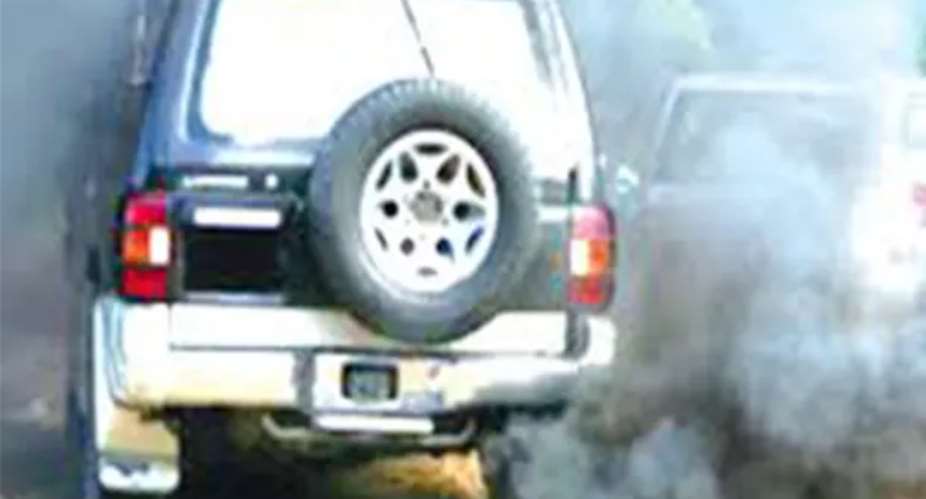Long commutes and poor-quality air are contributing to mental health problems too. A study published on JAMA Network, an American-based health platform found that long-term exposure to multiple air pollutants are associated with increased risk of depression and anxiety.
“Spending hours in vehicular traffic and being exposed to dirty air has some impacts,” says Dr. Reginald Quansah, a senior lecturer at University of Ghana School of Public Health. “Some studies have proposed some mechanisms justifying this. Stress is just one of them.”
Economic burden on workers and the nation
Workers' constant exposure to dirty air also has a strong economic burden for workers and the country.
“In the short and medium term, workers spend money buying cold and cough related drugs, medical tests, and suffer loss of many hours if hospitalised. It has an impact on their pocket especially those low earners,” says Dr. Elvis Kyere-Gyeabour, the Breathe Cities Portfolio Manager, Ghana.
For workers under insurance, not all treatment of ischemic heart disease, lung cancer, stroke, as well as pneumonia in children are covered. The costs can add up to the equivalent of twice the annual earnings of some patients.
And the costs also increase in retirement. “There is enough evidence that many workers exposed to high levels of air pollution during their productive years acquire chronic upper respiratory infection and cardiovascular diseases. Some retirees are required to undergo nebulisation every day using their retirement benefits,” says Dr. Kyere-Gyeabour.
The productivity loss hurts the economy and the National Health Insurance Scheme. The economic cost of air pollution is estimated at US$2.5 Billion or roughly 4.2 per cent of the country’s 2017 Gross Domestic Product according to a World Bank report.
Reducing pollution, promoting quality air
Ghana is looking at phasing out fossil fuel powered vehicles altogether over the next 21 years, according to a projection in the National Electric Vehicle Policy, but the industry says it will need immense government support even for that slow transition.
“We are the largest polluting sector, and we are ready to go electric but government needs to build the infrastructure and other structures before,” says Mr. Mark Amoamah, National President of the Chartered Institute of Transport – Ghana.
Reducing emissions from the transport sector before the phase-out will depend on a number of interventions starting with a review of regulations, awareness, and strict enforcement of regulations, according to experts.
“As we speak, a police officer cannot arrest a driver whose car is emitting so much. This is because they do not have any instrument to measure the (emissions) level,” says Emmanuel Appoh, Executive Director of Envirofit, an environmental consulting firm and a former Director at Environmental Protection Agency.
“But this will change when the Motor Traffic Regulation 2024 is passed and people are sensitised, and institutions strengthened and supported. For instance, every vehicle will need to test for tailpipe emission and get a certificate. With this, a police officer will have the tool to crack down on dirty vehicles,” he added.
Dr. Daniel Tutu Benefoh, Ghana's Focal Person of the United Nations Framework Convention on Climate Change, also wants to see government services decentralised and moved to different parts of Ghana so workers don't have to commute so long in dirty air.
“The colonial system centralised government services and provided housing for workers,” Dr. Benefoh notes. “But this failed after independence. The acquired lands where workers lived are being commercialised, while many middle and junior officers live far off and travel hours to work.”
Dr. Benefoh, who leads Ghana's Mitigation, Greenhouse Gas Inventory and Reporting Programme, suggests that organisations deploy buses to pick up workers from designated points to reduce the number of vehicles on the road contributing to pollution.
“Ghana needs an efficient bus system with dedicated line,” he emphasises.
While waiting for the many plans to manifest, he advises workers to wear N95 nose masks anytime they are on the road and also avoid rush hours, if possible.
By Albert Oppong-Ansah
This story was a collaboration with New Narratives. Funding was provided by the Clean Air Fund. The funder had no say in the story's content.





 Pentecost Pastor shot, robbed at Papaase
Pentecost Pastor shot, robbed at Papaase
 Ambulance case: AG accuses Jakpa, Big Sea of making 50% profit
Ambulance case: AG accuses Jakpa, Big Sea of making 50% profit
 Minority welcomes L.I on Cement price regulation
Minority welcomes L.I on Cement price regulation
 NDC MPs boycott parliamentary sitting again over Ato Forson’s trial
NDC MPs boycott parliamentary sitting again over Ato Forson’s trial
 Times are tough but Ghana will be worse if NDC is voted back to power, NPP far b...
Times are tough but Ghana will be worse if NDC is voted back to power, NPP far b...
 Financing gap threat to Africa’s SDGs aspirations – Akufo-Addo
Financing gap threat to Africa’s SDGs aspirations – Akufo-Addo
 Minority disputes govt claims of restructuring $1billion legacy debt with IPPs
Minority disputes govt claims of restructuring $1billion legacy debt with IPPs
 Midwife turns residential room into a labour ward at Kwadwo Addaikrom-Chief
Midwife turns residential room into a labour ward at Kwadwo Addaikrom-Chief
 I'm surprised people are challenging Mahama’s role in building UGMC — Franklin C...
I'm surprised people are challenging Mahama’s role in building UGMC — Franklin C...
![Chairman Wontumi [left] and Napo](https://cdn.modernghana.com/content__/84/56/72202440125-sxoaredq5l-wontumi-and-napo.jpg) Chairman Wontumi has never opposed Napo — Ashanti Regional NPP Youth Organizer c...
Chairman Wontumi has never opposed Napo — Ashanti Regional NPP Youth Organizer c...
